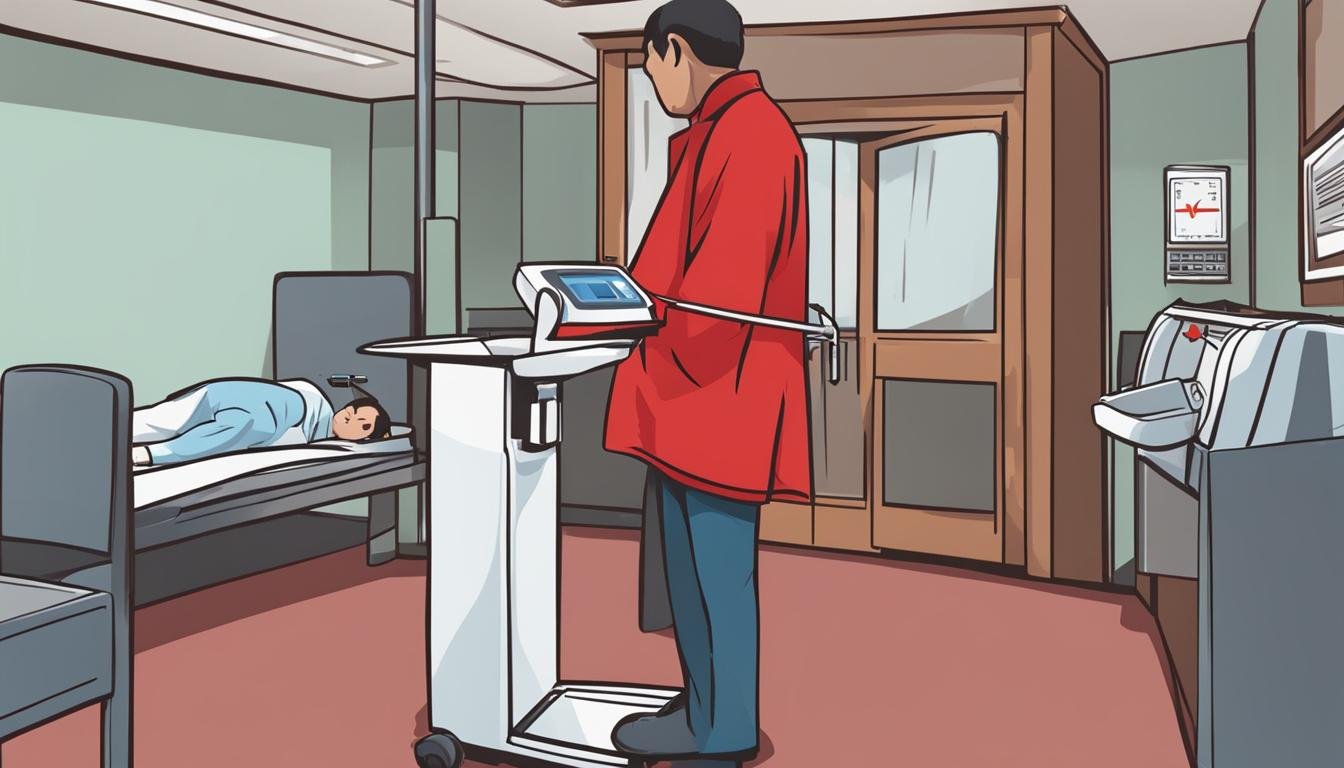After undergoing hernia surgery, some individuals may notice a surprising side effect: weight loss. This weight loss can raise concerns and questions about its cause and impact. Understanding the reasons behind weight loss after hernia surgery is important for a smooth recovery and overall well-being.
Key Takeaways:
- Weight loss after hernia surgery is not uncommon and can vary from person to person.
- Possible reasons for weight loss include reduced appetite, increased metabolism, stress, nausea, loss of muscle mass, and fluid loss.
- Not all weight loss after hernia surgery is problematic, but it is essential to identify any significant or unexplained weight loss.
- Proper nutrition, gradual return to physical activity, monitoring changes in weight, and regular follow-up appointments are crucial for managing weight loss after hernia surgery.
- Weight loss after hiatal hernia surgery is related to changes in diet and the effects of the procedure on the digestive system.
Potential Complications of Weight Loss After Hernia Surgery
While weight loss after hernia surgery is not uncommon, it is important to be aware of potential complications that may arise. Unexplained weight loss after hernia surgery can be a cause for concern and should be evaluated by a healthcare professional. There are several factors that can affect weight loss after hernia surgery, and understanding them can help determine if further investigation or intervention is necessary.
Factors Affecting Weight Loss After Hernia Surgery:
- Unresolved Problems: Significant and prolonged weight loss without an apparent explanation may indicate an unresolved issue related to the surgery or another underlying condition. It is important to seek medical attention if unexplained weight loss persists.
- Accompanying Symptoms: If weight loss is accompanied by other symptoms such as pain, fever, or digestive problems, it may be indicative of complications that require medical attention. These symptoms could be a sign of infection, adhesions, or other issues related to the surgery.
- Nutritional Deficiencies: Weight loss after hernia surgery can sometimes be related to insufficient nutrient intake or malabsorption. This can occur due to changes in digestion or dietary restrictions following surgery. Monitoring for signs of nutritional deficiencies, such as fatigue, hair loss, or poor wound healing, is important.
It is essential to consult with a healthcare professional if significant weight loss occurs after hernia surgery without a clear explanation. They can evaluate the individual’s specific situation, review medical history, conduct any necessary tests, and provide appropriate guidance for further management.

Understanding Weight Loss After Hiatal Hernia Surgery
Weight loss after hiatal hernia surgery is a common occurrence due to the changes in diet and the digestive system. Immediately after the procedure, patients may not eat or drink until their ability to swallow safely is verified. This leads to a liquid diet and gradual progression to soft foods, resulting in temporary weight loss. Additionally, the procedure may reduce the size of the stomach, leading to a decrease in appetite and gradual weight loss over time.
“Following hiatal hernia surgery, patients typically experience a period of dietary adjustment, which can contribute to weight loss. It is important to understand that this weight loss is usually temporary and can be managed with appropriate post-surgery dietary guidelines.”
H3: Managing Nutrition After Hiatal Hernia Surgery
Proper nutrition plays a crucial role in managing weight loss after hiatal hernia surgery. It is recommended to consume a balanced diet that includes a variety of nutrient-dense foods to promote healing and prevent nutritional deficiencies. Following the post-surgery dietary guidelines provided by your healthcare professional is essential to ensure a smooth recovery. Gradually reintroducing solid foods can help the body adjust and minimize weight loss. It is important to consult with a healthcare professional or a registered dietitian for personalized dietary recommendations based on your specific needs.
- Focus on eating small, frequent meals to avoid overloading the digestive system.
- Include protein-rich foods such as lean meats, poultry, fish, eggs, and legumes to support tissue repair and muscle recovery.
- Incorporate fruits and vegetables for essential vitamins, minerals, and fiber.
- Avoid spicy, acidic, and fatty foods that can irritate the digestive system.
- Stay hydrated by drinking plenty of water throughout the day.
- Consider taking nutritional supplements if recommended by your healthcare professional to ensure adequate nutrient intake.
By prioritizing proper nutrition and following the guidance of your healthcare team, you can support your body’s healing process and minimize weight loss after hiatal hernia surgery.
Weight and Hernia Surgery FAQs
If you’re considering or have recently undergone hernia surgery, you may have questions about the relationship between weight and the procedure. Here are some commonly asked questions and answers to help clarify any uncertainties:
Can weight gain cause a hernia?
Weight gain itself doesn’t directly cause a hernia, but it can contribute to the development or worsening of certain types of hernias. Excess weight puts increased pressure on the abdominal muscles, making them more susceptible to weakening and potential herniation. Therefore, maintaining a healthy weight through proper diet and exercise can help reduce the risk of a hernia.
Does weight affect the severity of a hernia?
The severity of a hernia is primarily determined by its size and the tissues involved. While weight itself doesn’t directly impact the severity, excess weight can place additional strain on the weakened abdominal muscles, potentially exacerbating symptoms and making hernias more uncomfortable or noticeable. It’s important to consult with your healthcare provider to evaluate your specific situation and determine the best course of action.
Should I lose weight before hernia repair surgery?
In some cases, losing weight before hernia repair surgery may be recommended to reduce the risk of complications during the procedure. However, this decision will depend on various factors, such as your overall health, the type and size of the hernia, and your surgeon’s recommendations. It’s important to have a thorough discussion with your healthcare team to determine the best approach for your specific situation.
Can weight loss impact hernia recurrence?
While weight loss can be beneficial for overall health, its direct impact on hernia recurrence is not well-established. However, maintaining a healthy weight is generally associated with better overall outcomes and reduced risk of complications. If you have concerns about weight loss after hernia surgery and its potential impact on recurrence, it’s important to discuss them with your healthcare provider for personalized guidance.
Remember, every individual’s situation is unique, so it’s crucial to consult with your healthcare provider for personalized advice regarding weight management and hernia surgery. By maintaining a healthy lifestyle and following your doctor’s recommendations, you can optimize your recovery and future well-being.
Conclusion
Weight loss after hernia surgery is a common occurrence that can be both expected and managed. It’s important to understand that weight loss can have various causes, such as reduced appetite, increased metabolism, and stress. However, it’s essential to differentiate between healthy weight loss and problematic weight loss.
To manage weight loss after surgery, it’s crucial to prioritize proper nutrition by following post-surgery dietary guidelines and consuming a balanced diet. Gradually returning to physical activity, staying hydrated, and getting adequate rest are also important for a smooth recovery. Additionally, monitoring weight changes and attending follow-up appointments can help ensure progress is on track.
Throughout the recovery process, it’s important to address any concerns and seek professional guidance. By understanding the potential causes of weight loss, managing nutrition, gradually returning to physical activity, and monitoring progress, individuals can work towards a successful outcome and a healthy recovery from hernia surgery.
FAQ
Why am I losing weight after hernia surgery?
Weight loss after hernia surgery can occur due to reduced appetite, increased metabolism, stress, nausea, loss of muscle mass, and fluid loss. However, weight loss is not universal and can vary from person to person.
What are the potential complications of weight loss after hernia surgery?
If significant weight loss occurs without an apparent explanation or if it continues for an extended period, it could be a sign of an unresolved problem. Other factors to consider include unintentional weight loss, accompanying symptoms, and signs of nutritional deficiencies.
How can I manage weight loss after hernia surgery?
To manage weight loss after hernia surgery, it is important to ensure proper nutrition by consuming a balanced diet that includes a variety of nutrient-dense foods. Following post-surgery dietary guidelines and gradually returning to physical activity can also help. Staying hydrated, getting adequate rest, managing stress, monitoring weight changes, and attending follow-up appointments are essential for a smooth recovery.
Why do people experience weight loss after hiatal hernia surgery?
Weight loss after hiatal hernia surgery is common due to changes in diet and the digestive system. Immediately after the procedure, patients may not eat or drink until their ability to swallow safely is verified. This leads to a liquid diet and gradual progression to soft foods, resulting in temporary weight loss. Additionally, the procedure may reduce the size of the stomach, leading to a decrease in appetite and gradual weight loss over time.
What are some common questions about weight and hernia surgery?
Many individuals have questions regarding the relationship between weight and hernia surgery. Common inquiries include whether weight gain can cause a hernia, the effect of weight on hernia severity, the possibility of being overweight for hernia surgery, and the impact of weight loss on hernia recurrence. Other questions revolve around weight loss prior to hernia repair surgery and the safety of losing weight after hernia surgery.

